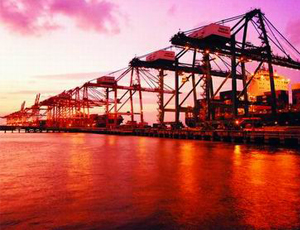Understanding Investment Trends in China’s Bonded Zones
 SHANGHAI – The General Administration of Customs (GAC) recently announced that all of China’s Special Customs Supervision Zones (SCSZs), which previously fell under six different categories, will be uniformly renamed as “Comprehensive Bonded Zones” (CBZs) later this year. Not only will the SCSZs be changing names, but also their basic function. The new CBZs are expected to serve enterprises engaged in bonded processing, bonded logistics and bonded services.
SHANGHAI – The General Administration of Customs (GAC) recently announced that all of China’s Special Customs Supervision Zones (SCSZs), which previously fell under six different categories, will be uniformly renamed as “Comprehensive Bonded Zones” (CBZs) later this year. Not only will the SCSZs be changing names, but also their basic function. The new CBZs are expected to serve enterprises engaged in bonded processing, bonded logistics and bonded services.
Since 1990, 113 areas have been approved as SCSZs to meet the needs of economic development in China. These areas fall under six categories, namely bonded zones, export processing zones, bonded logistics parks, cross-border industrial zones, bonded port zones and comprehensive bonded zones – each serving different enterprises and business activities. However, a lack of readily-available information regarding the specific functions of each zone has made it difficult for foreign investors to choose the right location for their business operations. The GAC also stated that not all enterprises will be permitted to operate in the CBZs.
In the “Guidelines on Projects Suitable for Entry into the Special Customs Supervision Zones (SCSZs) (Shujiafa [2012] No.196),” three categories of enterprises are highly encouraged to do business in the CBZs:
1. Bonded processing enterprises conducting any of these major types of transactions:
- Sourcing raw materials from Chinese non-bonded areas;
- Sourcing raw materials from overseas;
- Selling finished goods overseas; and
- Selling finished goods to Chinese non-bonded areas.
The processing enterprise’s target market will determine what kind of preferential policies apply. If the enterprise is selling to the domestic market, for example, the customs duty on the finished goods must be lower than the duty on the imported raw materials. This means that processing enterprises should avoid high consumption rate products such as tobacco, cosmetics and luxury goods.
RELATED: China Announces Preferential Policies for Three Development Zones
2. Bonded logistics enterprises conducting any of these major types of transactions:
- Importing goods stored in the bonded zones without a time limit;
- Importing goods to be transferred between CBZs;
- Packaging and assembly of imported goods;
- Transporting imported goods to Chinese non-bonded areas; and
- Transporting imported goods to foreign countries after basic processing.
3. Bonded service enterprises providing any of these major services:
- Research, testing, and maintenance;
- Exhibiting imported goods in special areas inside or outside of the bonded zones approved by Customs; and
- Outsourcing, including Information Technology Outsourcing (ITO) and Business Process Outsourcing (BPO).
Four categories of enterprises are not permitted for operations in the bonded zones:
- Manufacturing and processing enterprises that (1) are oriented to the domestic market and (2) make products whose import duty is higher than the duty on the related raw materials. As a result, high consumption rate products such as tobacco and cosmetics cannot be processed in the zones.
- Enterprises mainly operating a non-bonded business, which concerns goods sourced from the domestic market or imported via general trade.
- Manufacturing enterprises focused on domestic raw materials and high export duty products (or controlled export products).
- Manufacturing enterprises processing high energy consumption or high pollution products, or other products prohibited by the government.
The following preferential tax policies apply to enterprises operating in the zones:
- Import tariff exemptions apply to machinery, equipment and other materials used in infrastructure construction, a reasonable quantity of office supplies, and spare parts used for maintenance.
- Import goods brought into the zones may be exempt from import tariffs.
- Goods traded between enterprises in the bonded zones are exempt from VAT and consumption duties.
Asia Briefing Ltd. is a subsidiary of Dezan Shira & Associates. Dezan Shira is a specialist foreign direct investment practice, providing corporate establishment, business advisory, tax advisory and compliance, accounting, payroll, due diligence and financial review services to multinationals investing in China, Hong Kong, India, Vietnam, Singapore and the rest of ASEAN. For further information, please email china@dezshira.com or visit www.dezshira.com.
Stay up to date with the latest business and investment trends in Asia by subscribing to our complimentary update service featuring news, commentary and regulatory insight.
Related Reading
 An Introduction to Development Zones Across Asia
An Introduction to Development Zones Across Asia
In this issue of Asia Briefing Magazine, we break down the various types of development zones available in China, India and Vietnam specifically, as well as their key characteristics and leading advantages. We then go on to provide a snapshot of the latest development zones across the rest of Asia. With several hundred development zones operating in the region, it is impossible to cover them all in the pages of just one publication. However, we hope that this issue will provide the basic fundamentals to understanding one of the most important business tools available to international businesses operating in Asia.
 Guide to the Shanghai Free Trade Zone
Guide to the Shanghai Free Trade Zone
In this issue of China Briefing, we introduce the simplified company establishment procedure unique to the zone and the loosening of capital requirements to be applied nation wide this March. Further, we cover the requirements for setting up a business in the medical, e-commerce, value-added telecommunications, shipping, and banking & finance industries in the zone. We hope this will help you better gauge opportunities in the zone for your particular business.
Utilizing Development Zones in China
Asia’s Export Processing Zones and ASEAN Opportunities
Ten of Asia’s Most Dynamic Export Processing Zones
Understanding Development Zones in China
- Previous Article RMB Internationalization and the Shanghai FTZ
- Next Article Two China-Europe Free Trade Agreements to Come into Force on July 1



























